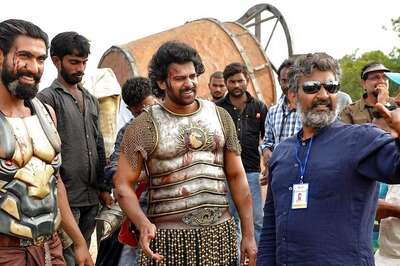
views
Extinct species remain in the footnotes, but Dynabook is different. It was a concept for a handheld personal computer before the adjective 'personal' got linked to the word 'computer'. Till 2008 it remained just an ideal - a battle scar on the legacy of Alan Kay, the creator, and two legendary venture capitalists, Vinod Khosla and John Doerr, who invested in Dynabook Technologies. But now, the world is ready for the concept.
Like the spread of great religions, deadly viruses and Himesh Reshammiya tunes, the modern avatar of Dynabook, the tablet, is everywhere. And it is bringing about a fundamental change in the way people 'negotiate' technology.
Take just two examples: Kishore Biyani, the retail honcho and Gaurav Mathur, a private equity investor. Biyani's interaction with the computer used to be limited to reading emails. Now silly trifles seem to interest him. Mathur was an intensive user of technology but the computer kept him so busy that he had "stopped listening to music and would only occasionally see a film". He now uses a US cash card to buy US television serials, songs and even films. "I have started buying music again," he says.
Companies like Vodafone, Idea Cellular and Bharti Airtel see it as a way to boost their data revenues because tablets consume 10 times as much data as smartphones do. It has content creators like Contest2Win excited because teenagers now have something more exciting than just the SMS! "Indian kids are over policed. My grandmother can still question me on why I come home late. Now imagine you have a device that you can take to your own room," says Alok Kejriwal of Contest2Win.
D for desire
Till the tablet came along, there were two clear divisions in the personal technology space: Personal computers and consumer electronic devices.
For most people, the PC is just a thing to be negotiated. In the last two decades, only three computer and software products have captured public imagination: The launch of the new Windows in 1995, Google search engine and Google mail. Conversely, consumer electronic devices - game consoles (Wii, Xbox, Playstation and now Kinect) and gadgets like iPod and iPhone - are the ones that have pushed the "desire" hot button in people's minds.
Computer makers have only themselves to blame because none of them sold simplicity, vanity, envy, pride or even plain greed. All they sold was a box with the sex appeal of a thermal power plant.
Now, the tablet is mixing the two spaces together. It is a desirable fun gadget and a functional device that lets you access work-related data. What allows it to do this is the Internet and cloud computing.
Paul Maritz, CEO, VMware, a cloud computing software company, says that the shift to tablet is profound. "Young workers of today - they work with streams of information. They filter it, recombine it with other inputs and then stream it back out again to the Internet," he says.
People do need files and folders, but the increasing proliferation of cloud architecture does away with the need for carrying gigabytes of data. The data and the logic sits on a remote industrial-strength computer, and users can tunnel through it on their tablets. They can interact among themselves because the Web enables that, and then work on that data.
A tablet is particularly handy for CEOs, CIOs and CTOs who are consumers of corporate information and not its creators.
A tonic to boost sales
Another key to the tablet's success is the emergence of a catalogue of apps. Esther Dyson, an inventor and a futurist, believes this will finally pave a way for people to start paying for content and services on the Web.
Think about it this way. The Web is a giant free public park. The tablet and app combination creates a paid amusement ride corner inside that park. You can always amuse yourself on the free merry-go-round or the swings, but if you want to experience the Ferris wheel, it is there. Because the app is inside a 'walled garden' of an iPad or a Samsung Galaxy Tab, consumers seem to find it a lot easier to pay for it.
And that means sustained demand for the tablets for years to come.
How exactly will apps do that? Microsoft's killer application, the Office suite, was created two decades ago and still remains the primary reason for people to pay for computers. While people love the free Web, it is not enough reason for them to keep upgrading and buying new computers. Now the apps will do that for the tablet. "In tablets, from the very beginning users are willing to pay for whatever they are consuming. That was just not the case with Internet," says Rajesh Reddy, CEO of July Systems, a mobile solutions company.
As millions of these nifty 'widgets' find their way into the marketplace and people start paying for them, it will create an incentive to develop better content and products. That starts a virtuous cycle. And that will get people to buy tablets the way they buy new mobile phones, TVs or cars - for their drool appeal and for their new features.
There is every indication that this process is already underway. The iPad2 was selling more than 2 million units barely a month after its launch in March. Apple can't actually keep up with the demand. This year, Apple is expected to sell about 20 million units. Gartner predicts that 65 million tablets will sell in 2011. This is a steep jump from the 15 million units the iPad1 sold. And the whole tablet phenomenon started just three years ago.
This numbers are small at the moment when you compare them to the 350 million PCs that are sold globally. But PC makers know that they cannot underestimate tablets. "Gartner says tablet sales will grow at 90 per cent, while IDC is saying they will grow at 50 per cent for the next three to four years," says Amar Babu, MD, Lenovo India. At these growth rates, tablets would be half the size of PC volumes in just three years.
That's why almost all PC makers have announced a tablet format launch in 2011, though they see the tablet as another form factor of the PC.
Indian summer
In India, the tablet as yet is restricted to the C-set (CXOs), but then that's where the adoption will in any case start. So the market here is small but it is surprising to see so many companies starting to experiment with it. Hindustan Unilever and Manipal Healthcare are trying to see if it can improve their operational efficiency. Max Healthcare is trying to consolidate all medical records in a single database, which doctors can access on the tablet as they move between clinics, out patients department and the operating theatre. IndiaInfoline has been thinking of doing something on the tablet but Sankarson Bannerjee, head of technology, can't seem to find an app developer on the Apple platform. "They are quoting dollar rates!" he says.
"But tablets are so elitist," the naysayers will maintain. Tablets are still priced closer to Rs. 40,000 than they are to the Rs. 10,000 'ideal price' for India. But as volume builds up, prices will go down. Even the beleaguered Nokia thinks tablets will change the game in India in a year-and-a-half. Vineet Taneja of Bharti Airtel says, "In 12-18 months they'll take off. In 12 months we'll have ubiquitous 3G coverage. Secondly, the price of the device will come down. Below Rs. 10,000 is the sweet spot. Nokia and Blackberry phones show that." In theory, even if just 1-2 per cent of mobile phone owners pick the tablet, that's 4-8 million units.
Indian companies like Lava Telecom know this. Lava will be launching its tablets around September for Rs. 17,000 - Rs. 20,000. It is using an Israeli company to develop some of the software that will make its tablets work. "When it comes down to $175-200 per customer, then the products will fly and that should happen by the fourth quarter of 2012," says S.N. Rai, founder, Lava Telecom. He expects around 7,000 to 8,000 tablets to sell this year; the next year will see about seven to eight times higher sales. The years after that, 20-25 per cent of the mobile market might be converted to tablets!
Gadget makers often underestimate the potential of their creations. IBM chairman Thomas Watson had famously said in 1943, "I think there is a world market for maybe five computers." Perhaps it is lowly journalists who get it right, just every once in a while as this quote from Byte magazine in 1994 shows: "Indeed, it would not be an exaggeration to describe the history of the computer industry for the past decade as a massive effort to keep up with Apple." It was true then but not very believable. Today it is both. An era is under way.



















Comments
0 comment